#vocab korean
Text
One-Page Masterlist
안녕하세요! Hey everyone! I recently got an ask about my old masterlist, which is the same as my broken-down masterlist except it has all of my lessons on one page, rather than on multiple separate posts. Some may find this expanded version easier to navigate, so I’ll keep this up for y’all! My broken-up masterlist, of course, will still be available for those who find that more helpful :)
Hangul Lessons
Consonants
Vowels
Writing/Reading Korean Syllables
Some 받침 Rules
Diphthongs
Stroke Order
Some More 받침 Rules
Irregular Verbs
The Basics
Common Phrases
Numbers
Sino-Korean vs. Native Korean Numbers (Instagram Post)
Sentence Structure and Particles
Present-Tense Conjugations and Formal Language
Adjectives
Questions
Honorifics and Casual Language
Beginner
Negative Sentences
잘 and 못
Past Tense
Future Tense (-ㄹ / 을 것이다)
-ㄹ / 을 까요? (Shall we…? / I wonder…?)
-(으)세요 (Giving Commands / Asking Questions)
Telling Time
-고 싶다 (I want to…)
How to Say “And”
-지만 (However)
아/어/여서 (So…)
Negative Commands
Spacing (띄어쓰기)
Adverbs
ㅂ Irregular
Comparatives and Superlatives
난, 날, & 내가
Upper-Beginner
-(으)면 (If…)
아/어/여도 (Even though…/Even if…)
(으)면 되다 / 아/어/여도 되다 (I can…/You may…)
-아/어도 되다: Asking for and Giving Permission (Instagram post)
-(으)면 되다 & -(으)면 안 되다 (Instagram post)
아/어/여야 되다 and 아/어/여야 하다(Have to / Should)
Present Progressive (-고 있다)
How to Say “Or”
-아/어/여하다
All About 중
How to Use -(으)로
Before & After
-ㄴ/은 채로
Intermediate
Describing Nouns with Verbs (-는 것)
Describing Nouns with Verbs - Past & Future Tense (-ㄴ/은 / -ㄹ/을 것)
Nominalization
것 같다 (I think… / It seems…)
-러 가다 / -러 오다
-(으)려고 (In order to…)
-기로 하다 (to Decide to do Smth)
척하다 (To Pretend)
-게 되다
-군요 / -구나
아/어/여 보다 (to try…)
-은/ㄴ 적 있다 / 없다 (I have / have not)
-ㄹ/을 게요 (Future Tense)
겠다
-ㄹ/을 수 있다/없다 (I can / cannot)
-ㄹ/을 때 (When…)
-ㄴ/는다면 (If)
-(으)면서 and -(으)며
-(으)니까 (Because / So)
-아/어/여주다
-(ㄴ/는)다 (Narrative Form)
Quoting
Let’s…
Quoting continued
(으)ㄹ래요? (Wanna…?)
-죠
-대로
More Quoting - 대 & 래
잘하다 & 못하다 vs. 잘 하다 & 못 하다
-아/어 가지고
-(으)려면
-는 길에 & -는 길이다
-(으)면 vs. -ㄴ/는다면 (Instagram Post)
-았/었을 것이다
-느라고
-는 데(에)
-ㄹ/을 뻔하다
Upper-Intermediate
-ㄴ/는데
-(으)ㄴ/는지 (Whether or not)
-(이)라는…
All About 아무리
-잖아요
Expressing Surprise
-시 (Honorific)
Making Comparisons
-아/어/여지다
I might…
So that…/To the point where…
Causative Verbs
시키다
Passive Verbs (part 1)
Passive Verbs (part 2)
-ㄴ/은가 보다 & -나 보다 (I guess…)
-ㄹ/을수록
Other Meanings of 싶다
-자마자 & -는 대로(As soon as…)
-긴 하다
-치고
-김에
차라리 (Rather)
-(으)ㅁ Nominalization
-기는 무슨 & -기는 개뿔
-고 보니까
-듯(이)
버리다
-(으)면 좋겠다 & -(으)면 하다
-길 바라다
Advanced
-거든(요)
-줄 알다/모르다
-ㄹ/을 테니까 and -ㄹ/을 텐데
-았/었던
아니라 and 대신에
-ㄹ/을 리가 없다
편이다, 별로, and More
-지 그렇다 (Why don’t you…?)
-ㄹ/을 걸
-ㄹ/을 까 보다
-다면서요
-다니 part 1
-다니 part 2
뜻이다 & 말이다
-다가
-더라고(요)
-더니
Some colloquialisms: 아니시에이팅 and 뭐 이렇게
-(으)ㅁ Sentence Ending
-다 보니까
What does 따위 mean?
-ㄴ/는데도
Korean Idioms
Vocabulary
Must-Know People
Must-Know Places
Must-Know Things
Must-Know Verbs
Must-Know Adjectives
Countries
Months, Days of the Week, and More
Clothing (옷)
School (학교)
Autumn (가을)
Autumn (w/Pictures!)
More Questions
House / Apartment (집 / 아파트)
Emotions / Feelings ( 감정)
Animals (동물)
Loan / Konglish Words
Food and Drink (먹을 것과 마실 것)
Parts of the Body (몸)
Counters
Modes of Transportation (교통 수단)
Colors (색깔)
Colors (with Pictures!)
Weather (날씨)
Winter (겨울)
Music & Instruments (음악과 악기)
Baking Gingerbread Cookies
Emergency (비상)
Hygiene & Bathroom (위생 & 화장실)
Indefinite Pronouns
Work / Office (일 / 사무실)
Spring (봄)
Coronavirus Prevention (코로나바이러스 방역)
How to Wash Your Hands (손을 씻기)
Time (시간)
Korean Cuisine (한식)
Summer (여름)
Summer (여름) w/Pictures!
Graduation (졸업)
Identity (독자성)
Korean Text Slang
Similar Words
Makeup w/Pictures! (화장품)
Family (with Pictures!)
Pronouns
How to Say “Still” and “Already” in Korean
Tastes & Textures (맛과 질감)
K-Pop Audition
K-Pop Fandom Terminology
Different Ways to Say “Change”
Flower Names
What Does 원래 Mean?
What does 오히려 Mean?
College
Hanja Lessons
최
수
악
식
급
동
부 & 불
애
출
퇴
예
음
중
학
습
연
생
대
입
인
문
감
과
원
특
만
후
무
Charts
Present, Past, and Future Tense
Question Words
잘 vs. 못 and Negative Conjugations
Future Tenses
-았/었던 vs. -던 (at end of lesson)
Particles
Some 받침 Rules
Gifving Commands
Conjunctions and -아/어/여서 vs. -(으)니까
-(으)면 vs. -다/라면 and Different Ways to Say “And”
How to Say “Or” (at end of lesson)
Telling Time (at end of lesson)
Comparatives and Superlatives
잘하다 & 못하다 vs. 잘 하다 & 못 하다 (at end of lesson)
Comparing 잘하다/못하다, 잘 하다/못 하다, & 수 있다/수 없다
Irregular Verbs
Pop Quizzes
Level 1
K-Pop Breakdowns
TXT - “Cat & Dog”
Twice - “Feel Special”
Enhypen - “Fever”
2NE1 - “Go Away”
Lee Hi - “Only”
“기억을 걷는 시간 (Time Spent Walking Through Memories)”
KCM - “An Old Love Story (흑백사진)”
Taeyeon - “Can’t Control Myself”
Epik High - “Lost One”
Colde - “A Song Nobody Knows”
IU - “My Sea”
Enhypen - “Polaroid Love”
유라 (youra) - “하양 (RAL 9002)″
BTS - “Ddaeng”
Stray Kids - “For You”
Woozie - “어떤 미래 (What Kind of Future)
TXT - “Eternally”
LOONA - “Heart Attack”
Stray Kids - “Muddy Water”
LOONA - “Girl Front”
Pentagon - “Daisy”
BTS - “Sea”
Semester in SK
Nami Island (남이섬)
Things to Buy at Daiso
Shopping Phrases
Ordering Coffee
Signs in Korea
Ordering at a Restaurant
Riding the Seoul Subway
Things at the 편의점
Korean Curse Words
Etiquette in South Korea
Drinking Culture
Hanja in Real Life
Holidays in South Korea
Korean Cuisine
Concert Ticketing in South Korea
K-pop Comebacks in Korea
Summer in South Korea
What I Learned
#korean#korean language#hangul#korean grammar#korean vocab#korean vocabulary#learn korean#learning korean#langblr#Korean langblr#masterlist#apok#apopofkorean#study korean#studying korean#kpop#kpop lyrics#basic korean#beginner korean#intermediate korean#advanced korean#hanja#한국어#한글#한자#한국어 공부하기#한국어 배우기#한국어 문법#한국어 어휘#초급 한국어
2K notes
·
View notes
Text
한국 전래동화에 나오는 어회와 문법 ! - Vocabulary and grammar in traditional Korean fairytales !
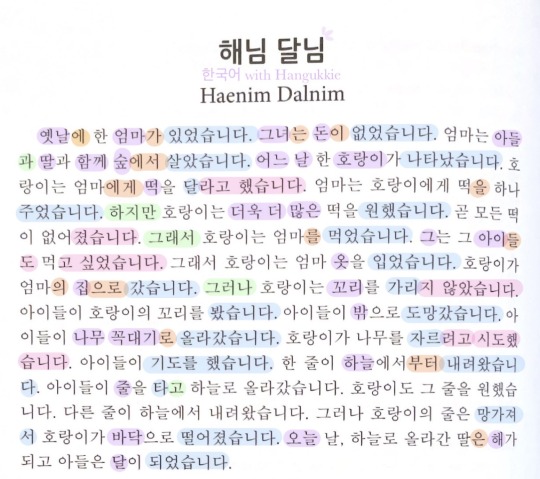
English Translation:
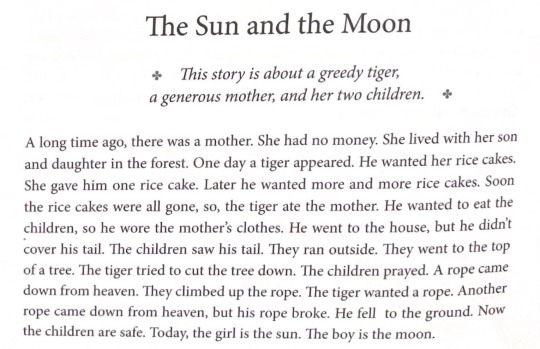
———————————————————
Vocabulary:
옛날 - Olden days
옛날에 - Once upon a time
어머니/엄마 - Mum
그녀 - She/Her
돈 - Money
아들 - Son
딸 - Daughter
함께 - Together
숲 - Forest
어느 - Which
날 - Day
호랑이 - Tiger
떡 - Rice cake
더욱 더 - More and more
많이/많은 - Many/A lot
그 - He/Him
아이 - Kid/Child
아이들 - Kids/Children
옷 - Clothes
집 - House
꼬리 - Tail
밖 - Outside
나무 - Tree
꼭대기 - The top
하늘 - Sky
줄 - Rope
바닥 - Floor
오늘 - Today
해 - Sun
달 - Moon
Grammar - Verbs:
있다 - To exist
없다 - To not exist
살다 - To live
나타나다 - To appear
달다 - To ask/To request (In this context)
주다 - To give
원하다 - To want/To wish/To desire
먹다 - To eat
가다 - To go
가리다 - To cover
보다 - To see
도망가다 - To run away
올라가다 - To go up
자르다 - To cut
기도를 하다 - To pray
내리다 - To get off
떨어지다 - To fall
된다 - To become
Grammar - Sentence Forms:
라고 하다 - For indirect quotations
지다 - To become
도 - Too/Also/As well as
고 싶다 - To want
지 않다 - Is not
려고 - To intend to
시도하다 - To attempt to
Grammar - Connectives:
과 - And/With (With 받침)
하지만 - But
그래서 - So
그러나 - But/However
하고 (고) - And/With
Grammar - Markers/Particles:
에 - To/At (Location and time marker)
가 - Subject particle
는 - Topic particle
이 - Subject particle (With 받침)
에서 - At/In/On/From (Location marker)
에게 - To/For
을 - Object particle (With 받침)
를 - Object particle
들 - Plural marker
의 - Possessive marker
으로 - By/As/For/To/Towards/With (Directional marker)
로 - By/As/For/To/With (Directional marker - with 받침)
부터 - From/Since (Location and time marker)
은 - Topic particle (With 받침)
#korean language#korean langblr#korean#langblr#korean study blog#korean studyblr#study blog#studyblr#korea#korean vocab#korean vocabulary#korean vocab list#Korean stories#Korean fairytales#Korean folktales#korean folklore#한국#한국어#한국어 공부#한국어 읽기#한국어 어휘#한국어 단어#한국어 문법#공부#읽기#어휘#단어#문법#한국 전래동화#전래동화
364 notes
·
View notes
Text
Vocabulary: house (rooms)
2023년 9월 19일
안녕하세요!
Today, we will learn how to say each room of the house!
House: 집
Bathroom: 화장실
Dining Room: 식당
Bedroom: 침실
Kitchen: 부엌
Living room: 거실
Downstairs: 아래층
Upstairs: 윗층
Garage: 차고
Garden: 정원
#gigiskjourney#korean langblr#korean language#korean learning#korean study#korean vocab list#korean vocabulary#learn korean#learning korean#studyblr#south korea#korean grammar#korean#korea#korean study blog#study korean#studying korean#한국어
178 notes
·
View notes
Text
Korean Slang [UPDATED]
I logged into tumblr for the first time in like YEARS and found out that I promised an updated Korean slang post 2 years ago😅
갓생 (gat-saeng) ➡️ "that girl" lifestyle, someone who's productive
고인물 (go-in-mul) ➡️ someone who's played a game for a long time
꾸안꾸 (kku-an-kku)➡️ no-makeup makeup
누물보(nu-mul-bo)➡️ "who asked?"
띵언 (dding-eon)➡️ a good quote
��선129 (meo-sun-il-e-gu) ➡️ what's going on
무물보 (mu-mul-bo)➡️ ask me anything
반모(ban-mo)➡️ banmal mode (not use honorifics)
성덕(sung-deok)➡️ successful fan (a fan whose met their idol)
식집사 (sik-jip-sa)➡️ plant mom/dad
스불재(seu-bul-je)➡️ self-inflicted disaster
알잘딱깔센(al-jal-ttak-kkal-sen)➡️ doing something well/perfectly on your own
어쩔티비 (eo-jjeol-tee-bi)➡️ "what are you gonna do"
억텐 (eok-ten)➡️ (I have a lot to say but I won’t say it)
워라벨(wo-la-bell) ➡️ work life balance
자만추 (ja-man-chu)➡️ (hurts my heart)
케바케 (ke-ba-ke)➡️ case by case
아아 (ah-ah)➡️ ice americano
주불(ju-bul)➡️ tell me your address
킹받네(king-bat-ne)➡️ something/someone is annoying
#korea#korean#learn korean#korean vocab#korean words#korean word of the day#korean vocab list#korean slang#langblr#languageblr
409 notes
·
View notes
Text
Different words meaning 'to use'.
이용하다 - to utilise something for the beneficial facility or function it offers (can also refer to taking advantage/exploiting in a negative way)
쓰레기통을 이용하세요 = please use the trash can
이용자 = a user/visitor of a facility or space
인터넷 이용자 = a user of the internet
도서관 이용자 = a library goer
사용하다 - to use, operate or employ a tool of some kind
컴퓨터를 사용해도 되나요? = May I use the computer?
사용설명서 = instruction manual (lit. usage + explanation + document)
사용자 = consumer/utiliser of something
스페인어 사용자 - user(speaker) of Spanish
유용하다 - to possess uses/functions, able to be utilised positively
병을 여는 데 아주 유용해요 = it's useful/great for opening bottles
유용한 표현을 배우야 해 = you must learn useful/useable phrases
쓰다 - to use or employ something or wear (in terms of some accessories) (also means 'to write' and 'to be bitter'.)
돈을 썼어 = I spent my money
안경을 쓰는 사람 = a person who wears glasses
이것은 어디에 쓰는 겁니까? = where/what is this used for?
연필을 쓰세요 - please use a pencil (whereas 연필로 쓰세요 would be please write in pencil
tldr: 쓰다 is more simple and common in speech but is essentially the same as 사용하다. 이용하다 has a different nuance of referring to making use of a facility offered by an object or space (e.g. using the bathroom, the internet, public transport) rather than 쓰다/사용하다 being the personal, often physical, manipulation of a thing (e.g. using toilet paper, using photoshop, using a pencil). 유용하다 is not about the actual use of something, more a remark on something's ability to be used/useful. The recurring ~용 character of these words comes from the Chinese/Hanja 用 which refers to use, function, utilisation, consumption.
#korean#korean language#korean langblr#langblr#studyblr#korean studyblr#korean vocab#korean grammar#korean verbs
119 notes
·
View notes
Text

🌸🌼🌸 30-Day Journey to Korean Language Mastery! 🌸🌼🌸
Hey there language lovers! Are you ready for an exciting adventure in learning Korean at a more intermediate level? 🇰🇷✨ In this 30-day study schedule, we'll dive into some juicy grammar topics that'll take your Korean skills to the next level. Ready to embark on this language adventure? Let's rock this 30-day challenge together! Happy studying and remember, every step counts on the road to Korean language mastery! 화이팅! 💪✨
Week 1: Verb Modification and Advanced Sentence Structures
Day 1: Time to dust off those honorifics and level up your respect game! Show some love to those verbs with various honorific verb endings.
Day 2-3: Let's express our wishes and assumptions with "았/었으면 좋겠다" (I wish I had) and "-(으)ㄹ 텐데" (I suppose, I think). Wishful thinking, here we come! 🌠
Day 4-5: No more doubts about "have to" or "can do"! Master "-아/어/여야 하다" (have to, must) and "-아/어/여도 되다" (can, may).
Day 6-7: Weave your magic into sentences with various verb modifications and advanced structures using the things you've studied the past few days.
Week 2: Subjunctive and Concessive Expressions
Day 8-9: Curiosity piqued? Delve into "-아/어/여 보다" (try to do) and "-아/어/여지다" (become something). Adventure awaits! 🚀
Day 10-11: Unveil the power of "even if" with "-더라도" and the allure of "either" with "-든지".
Day 12-13: Embrace "no matter how much someone says" with "아무리~-(으)라고 해도" and the certainty of "regardless of" with "-든간에".
Day 14: Take a deep breath and look back on the amazing grammar points we've conquered so far! You're soaring to new heights! 🦅
Week 3: Advanced Particles and Connectives
Day 15-16: Adventure calls! Set out on "-을 테니까" (since I will) and navigate "-느라고" (because of, due to).
Day 17-18: Embrace the twists and turns of "-를 지경이다" (to the extent of) and "-는바람에" (because of, on account of). The path may be challenging, but you're up for it!
Day 19-20: "Even if it's tough, let's do it!" Dive into "-아/어/여서라도" and "might have to do" with "-아/어/여야 할지도 모르다".
Day 21: Let's take a moment to bask in the glory of the grammar points we've mastered in Week 1 to Week 3. Proud language learners unite! 🌟
Week 4: Expressing Intention and Assumptions
Day 22-23: Master the art of expressing intentions with "기로 하다" (decide to do) and "으려던 참이다" (was about to do). Your plans are set in motion!
Day 24-25: Delve into assumptions with "ㄴ/는다고 하다" (heard that) and "ㄹ/을 것 같다" (seems like). The mystery unfolds! 🔍
Day 26-27: Let's get speculative with "것 같으면서" (while feeling like) and "(으)니까" (since, because). The intrigue continues! 🕵️♂️
Day 28: Embrace your linguistic prowess as you navigate the subtleties of intention and assumptions. Let's recap the past few days!
Week 5: Advanced Particles and Expressions
Day 29-30: Explore the nuances of "만에 하다" (to do after a long time) and "아니면서도" (although, even though). Time to fine-tune your expressions!
Day 31: Reflect on your incredible progress and pat yourself on the back for conquering advanced grammar structures. You've come so far, and there's no stopping you now! 🎉
#Learn#Learning#Language Learning#korean#studyblr#koreanblr#langblr#study#vocabulary#vocab#words#studying#Vocabulary#Vocab#Words#Practice#study challenge#30 day challenge#language
226 notes
·
View notes
Text
231212 Vocab
반추: rumination, reflection
어떤 일을 여러 번 계속하여 생각함. 또는 그런 일.
The act of constantly thinking about a matter, or such a matter.
역이용하다: turn something to one's own advantage; turn something against itself
어떤 목적을 가지고 있는 것을 그 반대의 목적으로 이용하다.
To use something for a purpose opposed to its original purpose.
어여쁘다: beautiful, lovely
(옛 말투로) 예쁘다.
(old-fashioned) Pretty.
이치: reason, principle, sense
정당하고 도리에 맞는 원리. 또는 근본이 되는 목적이나 중요한 뜻.
A right principle consistent with reason, or underlying purpose or significant meaning.
일구다: create
어떤 현상이나 일 등을 일으키다.
To cause a certain phenomenon, matter, etc.
공통분모: common denominator, something in common
(비유적으로) 여럿 사이에 서로 같은 점.
(figurative) A common point among different people.
궁핍: being poor
물질적으로나 정신적으로 가난하고 여유가 없는 상태.
The state of being materially and mentally poor.
허술하다: shabby; humble
낡고 헐어서 보잘것없다.
Being old and worn out, making it look worthless.
탁상공론: desk theory
실제로 이루어질 가능성이 적은, 헛된 이론이나 논의.
An impractical theory or discussion, whose possibility of coming true is low.
도출: inference
어떤 일에 대한 생각, 결론, 판단 등을 이끌어 냄.
The act of deriving a thought, conclusion, decision, etc., about something.
구현: embodiment, materialization, realization
이념이나 사상, 계획 등을 구체적인 모습으로 나타나게 함.
Making an idea, thought, plan, etc., appear in a concrete form.
#한국어#한국어 공부#공부계#한국어 공부하기#한국어 배우기#new vocab#studyblr#study korean#learning korean#korean#korean vocabulary#south korea#korean language#learning languages#language#langblr#language study#language learning#korean learning#tumblog#tumblr blog#learning#노트정리#공블러
67 notes
·
View notes
Text
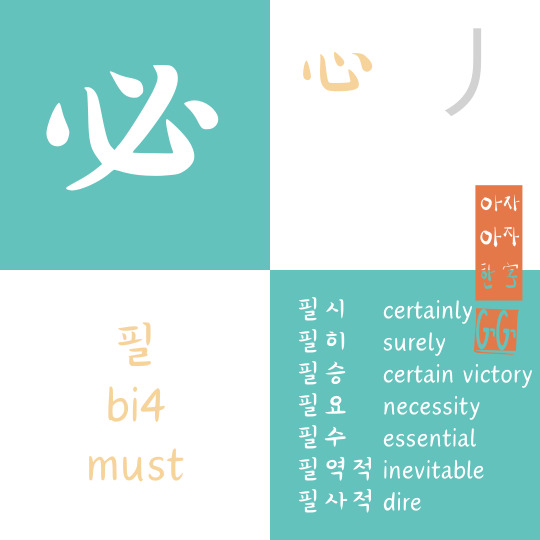
必 bi4 필
if you'd like to support me, check out my ko-fi!
character story:
It is necessary to follow your 丿일 one and only 心 심 heart to live a happy life.
Study vocab here!
Vocab:
필시 Certainly
필히 Surely
필승 Certain victory
\필요* Necessity
필요하다 to need (I need, we need, etc)
필요있다 to be necessary
필수** Being essential
필수과목 required course
필수조건 essential condition
필수품. Necessities
필연적. Inevitable
필사적 Desperate/dire
#5lvl#family: heart#필#bi4#alt:#korea#korean#korean language#korean learning#hanja#korean study#study korean#korean vocabulary#korean langblr#hanja vocab#hanja vocabulary#korean vocab#langblr#language#chinese characters#studyblr#original#ajaajahanja
55 notes
·
View notes
Text
Agust D - Amygdala [lyrics+vocab]

I don't know your name
I don't know your name, yeah
I don't know your name
요즘 기분은 어때?
I don't know your name, your name, your name
기억들로 여행
지우고픈 일들
요즘 기분은 어때, 어때, 어때?
▫ 요즘 - lately
▫ 기분 - mood
▫ 요즘 기분은 어때? = How have you been feeling lately?
▫ 기억 - memories
▫ 여행 - travel, trip
▫ 지우다 - to erase
지우고픈 일들 = 지우고 싶은 일들 = Things I want to erase
천구백구십삼
내가 태어난 달
엄마 심장의 수술, 수술, 수술
별의별 일이 많았지
뭐가 이리 다사다난한지
기억조차 안 나는 기억도
다 꺼내 보자고 하나씩
다 꺼내 보자고 하나씩
▫ 태어나다 - to be born
▫ 달 - month
▫ 심장 - heart
▫ 수술 - surgery
▫ 별의별 - all kinds of, various
▫ 다사다난하다 - to be eventful
▫ 꺼내다 - to take out
▫ 하나씩 - one by one
최선들의 선택
다음 차선들의 선택
차차 선들의 선택, 선택, 선택, yeah
원치 않던 일들
내 통제 밖의 일들
자 집어넣자 하나둘
그래 하나둘, 그래 하나둘
▫ 최선 - the best
▫ 선택 - choice, decision
▫ 차선 - the second best
▫ 원하다 - to want
▫ 통제 - control
▫ 밖 - outside, out of
▫ 집어넣다 - put sb into, throw sb into
I don't know your name, your name, your name
기억들로 여행, 여행, 여행
I don't know your name, your name, your name
자 지워보자 하나씩, 그래 하나씩
My amygdala (My amygdala)
어서 나를 구해줘 어서 나를 구해줘
My amygdala (My amygdala)
어서 나를 꺼내줘 어서 나를 꺼내줘
My amygdala (My amygdala)
My amygdala (My amygdala)
이곳에서 구해줘 어서 빨리 꺼내줘, yeah, yeah
▫ 어서 - hurry, fast
▫ 구하다 - to save
▫ 이곳 - this place, here
▫ 빨리 - fast
Uh-uh, 그래 참 별의별 일이 많았지
Uh-uh, 귓가엔 엄마 심장 시계 소리
Uh-uh, 전하지 못했던 내 사고 소식과
스케줄 중에 걸려 온 전환 아버지의 간암 소식
(Woah-oh) 최선의 선택들이 맞았었길
(Woah-oh) 그 또한 모두 지나가 버렸기에
그래서 이 수많은 고통은 날 위한 것일까
끊임없던 시련은 날 죽이지 못했고
다시금 나는 연꽃을 피워내
▫ 귓가 - around my ears
▫ 엄마 심장 시계 소리 - the sound of the clock in my mom's heart
▫ 전하다 - to convey
▫ 사고 - accident
▫ 소식 - news
▫ 스케줄 - schedule
▫ 전화가 걸려오다 - to get a phone call
▫ 간암 - liver cancer
▫ 맞다 - to be correct
▫ 지나가다 - to pass
▫ 고통 - pain
▫ 끊임없다 - to be ceaseless
▫ 시련 - ordeal, hardship
▫ 죽이다 - to kill
▫ 다시금 - again
▫ 연꽃 - lotus
▫ 피우다 - to bloom
136 notes
·
View notes
Text
Happy Pride! Let’s look at some Korean LGBT+ Terms

엘지비티: LGBT
레즈비언: Lesbian
게이: Gay
양성애: Bisexual
트랜스젠더 (or 트렌스): Transgender
퀴어: Queer
인터섹스: Intersex
무성애자: Asexual
퀘스처닝: Questioning
범성애자: Pansexual
얼라이: Ally
바이젠더: Bigender
에이젠더: Agender
논바이너리: Nonbinary
이성애: Straight
트랜스여성: Trans woman
트랜스남성: Trans man
씨스젠더: Cisgender
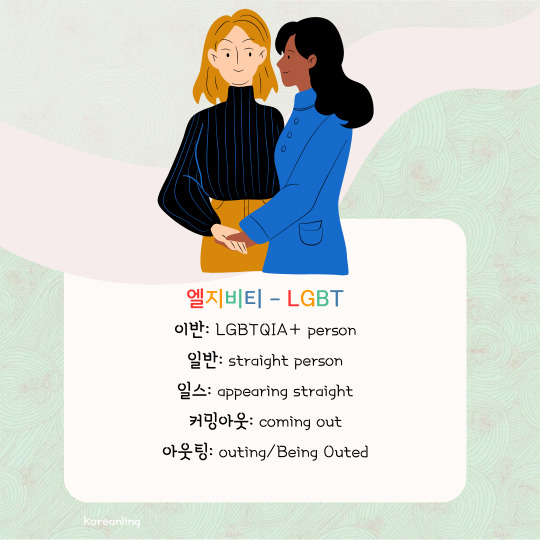
Some Quick LGBT Slang
이반: LGBTQIA+ person (이반인 “abnormal people” – note: not derogatory lgbt claimed this themselves)
일반: straight person (일반인 “normal people”)
일스: appearing straight (short for “일반 스타일 “normal style”)
커밍아웃: coming out
아웃팅: outing/being outed – someone exposes you and forces you out
78 notes
·
View notes
Text
Semester in SK: Korean Curse Words
안녕하세요 여러분! I’m sharing yet another Instagram post with you all--this one is about a bunch of Korean curse words! Very silly, I know, but curse words are a big part of any language and can be fun to learn about! Of course, be careful when using these and please do not use them often--I’m just sharing them for fun and so you can recognize them if you hear them :) I hope you enjoy! 화이팅!

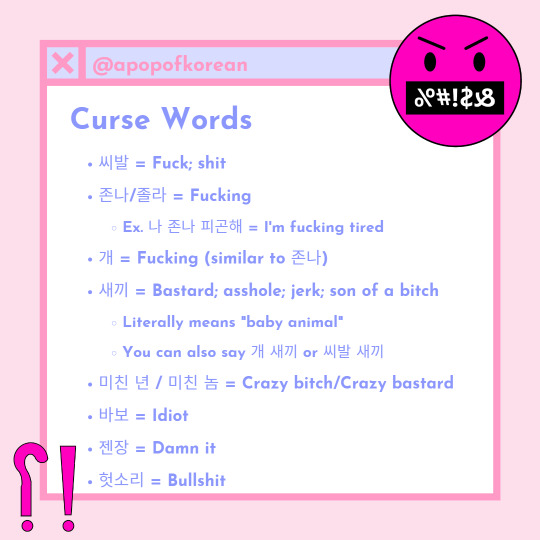
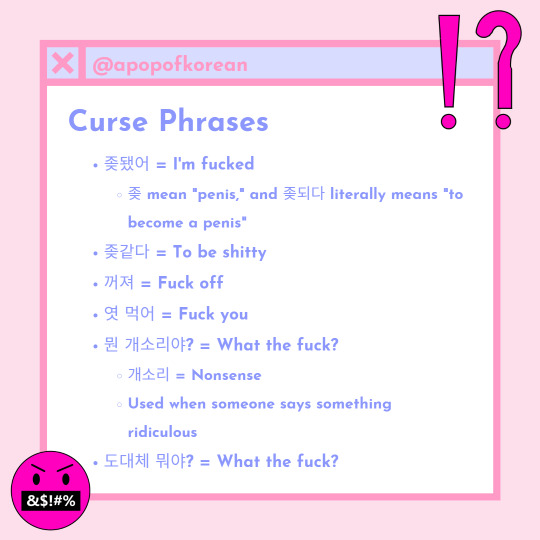
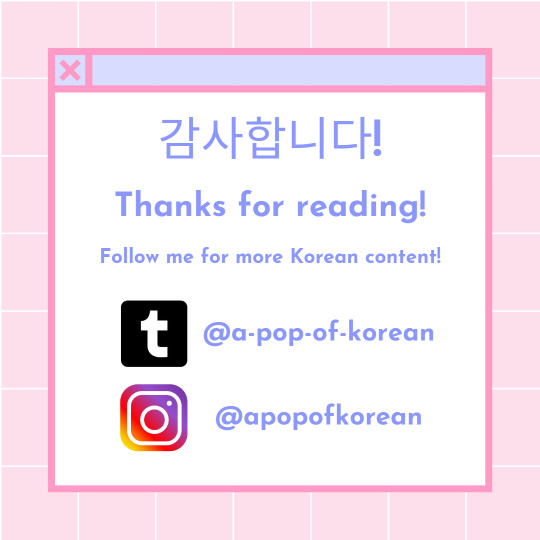
My masterlist
Join my Discord chat here to practice Korean with others!
Follow me on Instagram here for more Korean content!
Get Drops Premium using my affiliate link to expand your Korean vocab!
Check out my Ko-Fi to support this blog and my studies! Thank you for your generosity!
#korean#korean language#korean vocabulary#korean vocab#study abroad#learn korean#learning korean#study korean#studying korean#korean culture#유학#유학생활#한국#한국 문화#어휘#한국어#한국어 공부하기#한국어 배우기#langblr#korean langblr
392 notes
·
View notes
Text
Korean Weather Vocabulary
Watch my lesson on weather in Korean: https://www.youtube.com/watch?v=D0V_FJsVzkI
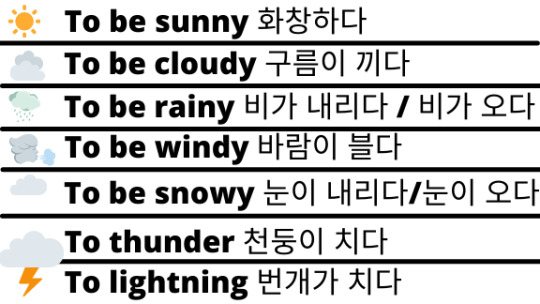
#korean lesson#learn korean#korean#korean vocabulary#korean vocab list#korean vocab#beginner Korean#beginner korean lesson#Korean language#language learning#learning korean#languageblr#language study#langblr#weather in Korean
44 notes
·
View notes
Text
Multilingual vocabulary about time
ENG - ITA - FRA - ESP - KOR
time - (il) tempo/(l')ora - (l')heure - (la) hora - 시간
morning - (il) mattino/(la) mattina - (le) matin - (la) mañana - 아침
afternoon - (il) pomeriggio - (l')après-midi - (la) tarde - 점심
evening - (la) sera - (le) soir - (la) tarde/(la) noche - 저녁
night - (la) notte - (la) nuit - (la) noche - 밤
noon/midday - (il) mezzogiorno - (le) midi - (el) mediodía - 정오
midnight - (la) mezzanotte - (le) minuit - (la) medianoche - 자정
early - presto - de bonne heure - temprano - 일찍
late - tardi - tard - tarde - 늦게
soon - presto - bientôt - pronto - 곧
later - dopo/più tardi - plus tard - más tarde - 나중에
now - adesso/ora - maintenant - ahora - 지금/이제
when...? - quando...? - quand...? - cuando...? - 언제…?
what time is it? - che ore sono? - quelle heure est-il? - qué hora es? - 몇 시예요?
hour - ora - heure - hora - 시
minute - minuto - minute - minuto - 분
second - secondo - seconde - segundo - 초
it's seven o'clock - sono le sette (in punto) - il est sept heures - son las siete (en punto) - 일곱시예요
it's seven fifteen/it's a quarter past seven - sono le sette e un quarto - il est sept heures et quart - son las siete y cuarto/y quince - 일곱시 십오분이에요
it's half past seven/it's seven thirty - sono le sette e mezza/sono le sette e trenta - il est sept heures trente/il est sept heures et demie - son las siete y media - 일곱시 반이에요 / 일곱시 삼십분이에요
it's a quarter to seven - manca un quarto alle sette/sono le sette meno un quarto - il est sept heures moins le quart - son las siete meno cuarto - 일곱시 십오분 전이에요
it's seven a.m. - sono le sette di mattina - il est sept heures du matin - son las siete de la mañana - 오전 일곱시에요
it's seven p.m. - sono le sette di sera - il est sept heures du soir - son las siete de la tarde/noche - 오후 일곱시에요
in 30 seconds - in 30 secondi - en/dans 30 secondes - en/dentro de treinta segundos - 삼십초 안에
in two minutes - in due minuti - en/dans deux minutes - en/dentro de dos minutos - 이분 안에
in one hour - in un'ora - en/dans une heure - en/dentro de una hora - 한시간 안에
in fifteen minutes/in a quarter of an hour - in quandici minuti/in un quarto d'ora - en/dans quinze minutes/dans un quart d'heure - en/dentro de quince minutos - 십오분 안에
in half an hour/in thirthy minutes - in mezz'ora/in trenta minuti - en/dans trente minutes/dans une demie-heure - en/dentro de treinta minutos - 삼십분 안에
#multilingual#polyglot#languages#korean#french#spanish#english#italian#time#vocabs#vocabulary#시간#hour#hora#heure#ora
85 notes
·
View notes
Text
Vocabulary: body.
2023년 7월 20일
안녕하세요!
Today i'll share some body's vocabulary.
Head = 머리
Face = 얼굴
Neck = 목
Shoulder = 어깨
Elbow = 팔꿈치
Arm = 팔
Hand = 손
Finger = 손기락
Thigh = 허벅지
Leg = 다리
Knee = 무릎
Feet = 발
Toes = 발가락
Next time i'll get into the face parts!
See you!
#gigiskjourney#korean langblr#korean language#korean learning#korean study#korean vocab list#korean vocabulary#learn korean#learning korean#studyblr#korean study blog#study korean#studying korean#korean#south korea#korea#korean grammar#한국어
247 notes
·
View notes
Text
졸업 🎓!! - Graduation 🎓!!




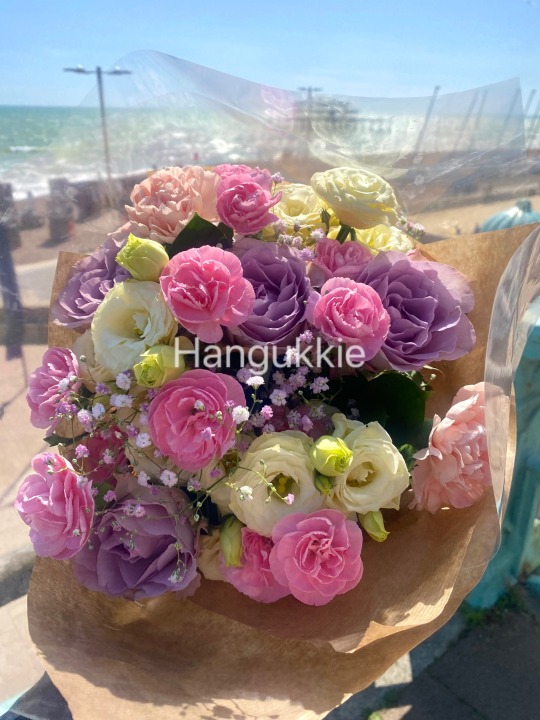




캬아ㅏㅏ~~ 졸업했어요 🥹💐🎓!!
———————————————————
Aaaaaaa!! I graduatedd 🥹💐🎓!!
#I FINALLY GRADUATED AAAAAAAAAA YESSSSSSSS YAHOOOOO WOOHOOOO YIPPEEEEE AJKWNHDBSBEJSJSBWBSHSMKH !!!#korean language#korean langblr#korean#langblr#korean study blog#korean studyblr#study blog#studyblr#korea#korean vocab#한국어 어휘#korean vocabulary#한국#한굴#한국어#어휘#hangul#korean vocab list#한국어 일기#한국어 연습#한국어 공부#졸업#셀카#graduation#personal#졸업식#졸업했어요#university#대학생
46 notes
·
View notes
Text
combination terms
I don't know what else to call these, but they refer to two opposing things that are often referred to together in one phrase to illustrate a breadth of span of the concept.
north and south- 남북 (often refers the two Koreas.)
east and west - 동서
pros and cons - 장점과 단점 can be seen shortened to 장단점. (점 means point)
strengths and weaknesses - 강점과 약점 (similar to above) (강 means strong and 약 means weak)
long and short term - 장기와 단기 can be seen shortened to 장단기 (기 refers to a time period)
up and down - 위아래(로)
side to side - 좌우(로) (좌 refers to 'left' and 우 is 'right' but from Hanja rather than 왼쪽/오른쪽 from native Korean)
here and there - 여기저기(에)
coming and going/back and forth between places - 왔다갔다하다
push and pull - 밀다 당기다 can be seen shortened to 밀당 (can refer to playing hard to get)
30 notes
·
View notes